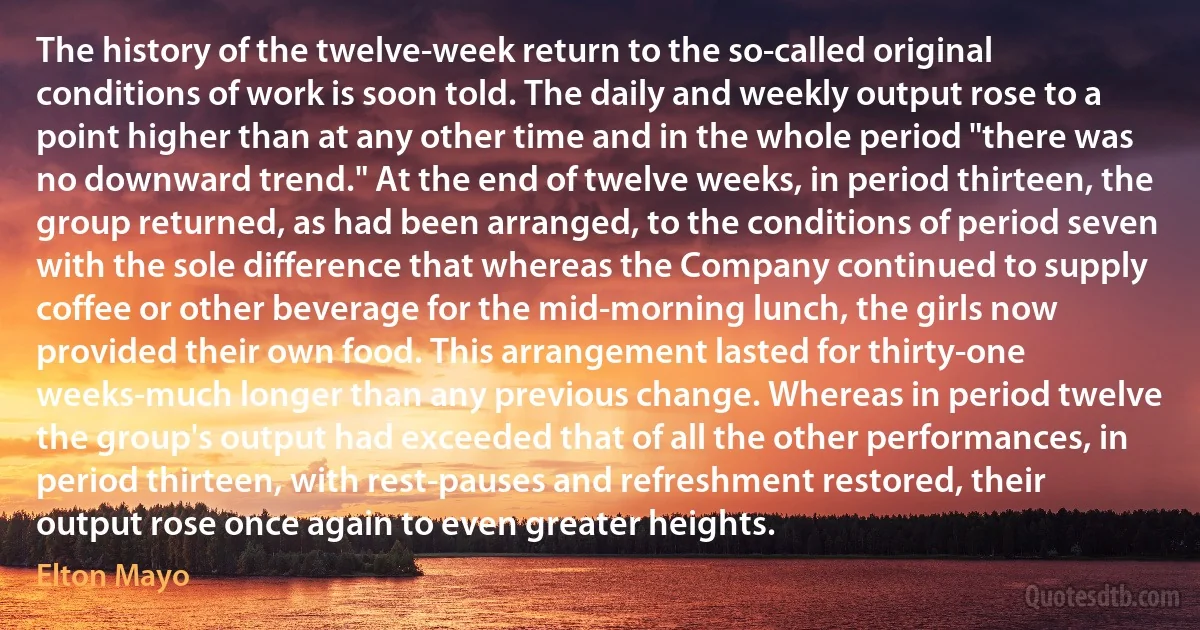
The history of the twelve-week return to the so-called original conditions of work is soon told. The daily and weekly output rose to a point higher than at any other time and in the whole period "there was no downward trend." At the end of twelve weeks, in period thirteen, the group returned, as had been arranged, to the conditions of period seven with the sole difference that whereas the Company continued to supply coffee or other beverage for the mid-morning lunch, the girls now provided their own food. This arrangement lasted for thirty-one weeks-much longer than any previous change. Whereas in period twelve the group's output had exceeded that of all the other performances, in period thirteen, with rest-pauses and refreshment restored, their output rose once again to even greater heights.
Elton MayoRelated topics
arrangement change coffee company daily difference end food history longer lunch now once output point return rose seven tell time trend twelve work higher girlsRelated quotes
Always to me any aroused group was a good group, and therefore I accepted an invitation to talk to the women's branch of the Ku Klux Klan at Silver Lake, New Jersey, one of the weirdest experiences I had in lecturing. [...] Never before had I looked into a sea of faces like these. I was sure that if I uttered one word, such as abortion, outside the usual vocabulary of these women they would go off into hysteria. And so my address that night had to be in the most elementary terms, as though I were trying to make children understand. In the end, through simple illustrations I believed I had accomplished my purpose. A dozen invitations to speak to similar groups were proffered. The conversation went on and on, and when we were finally through it was too late to return to New York.

Margaret Sanger
Although we revolutionary socialists are always accused of being Utopian, nothing strikes me as more Utopian than the reformist belief that with a bit of tinkering and some good faith, we can systematically improve the world. You have to ask how many decades of broken promises and failed schemes it will take to disprove that hope. Marxism isn't about saying you'll get a perfect world: it's about saying we can get a better world than this one, and it's hard to imagine, no matter how many mistakes we make, that it could be much worse than the mass starvation, war, oppression, and exploitation we have now. In a world where 30,000 to 40,000 children die of malnutrition daily while grain ships are designed to dump food into the sea if the price dips too low, it's worth the risk.

China Miéville
We can see that in putting the question "what is man?" what we mean is: what can man become? That is, can man dominate his own destiny, can he "make himself," can he create his own life? We maintain therefore that man is a process and, more exactly, the process of his actions. If you think about it, the question itself "what is man?" is not an abstract or "objective" question. It is born of our reflection about ourselves and about others, and we want to know, in relation to what we have thought and seen, what we are and what we can become; whether we really are, and if so to what extent, "makers of our own selves," of our life and of our destiny. And we want to know this "today," in the given conditions of today, the conditions of our daily life, not of any life or any man.

Antonio Gramsci
We ought to be able to see more clearly just for what reason the mass-man is so easily turned into a fanatic. What I seem to myself to have grasped is this, that such permeability is due to the fact that man, that the individual, in order to belong to the mass, to be a mass-man, has had, as a preliminary, though without having had the least awareness of it, to divest himself of that substantial reality which was linked to his initial individuality or rather to the fact of his belonging to a small actual group. The incredibly sinister role of the press, the cinema, the radio, has consisted in passing that original reality through a pair of flattening rollers to substitute for it a superimposed pattern of ideas and images with no real roots in the deep being of the subject of this experiment.

Gabriel Marcel
Now, there's no easy answer for resolving all these social forces, and we must respect the meaning that people draw from their own traditions -- from their religion, from their ethnicity, from their sense of nationhood. But I do not believe progress is possible if our desire to preserve our identities gives way to an impulse to dehumanize or dominate another group. If our religion leads us to persecute those of another faith, if we jail or beat people who are gay, if our traditions lead us to prevent girls from going to school, if we discriminate on the basis of race or tribe or ethnicity, then the fragile bonds of civilization will fray. The world is too small, we are too packed together, for us to be able to resort to those old ways of thinking.

Barack Obama
